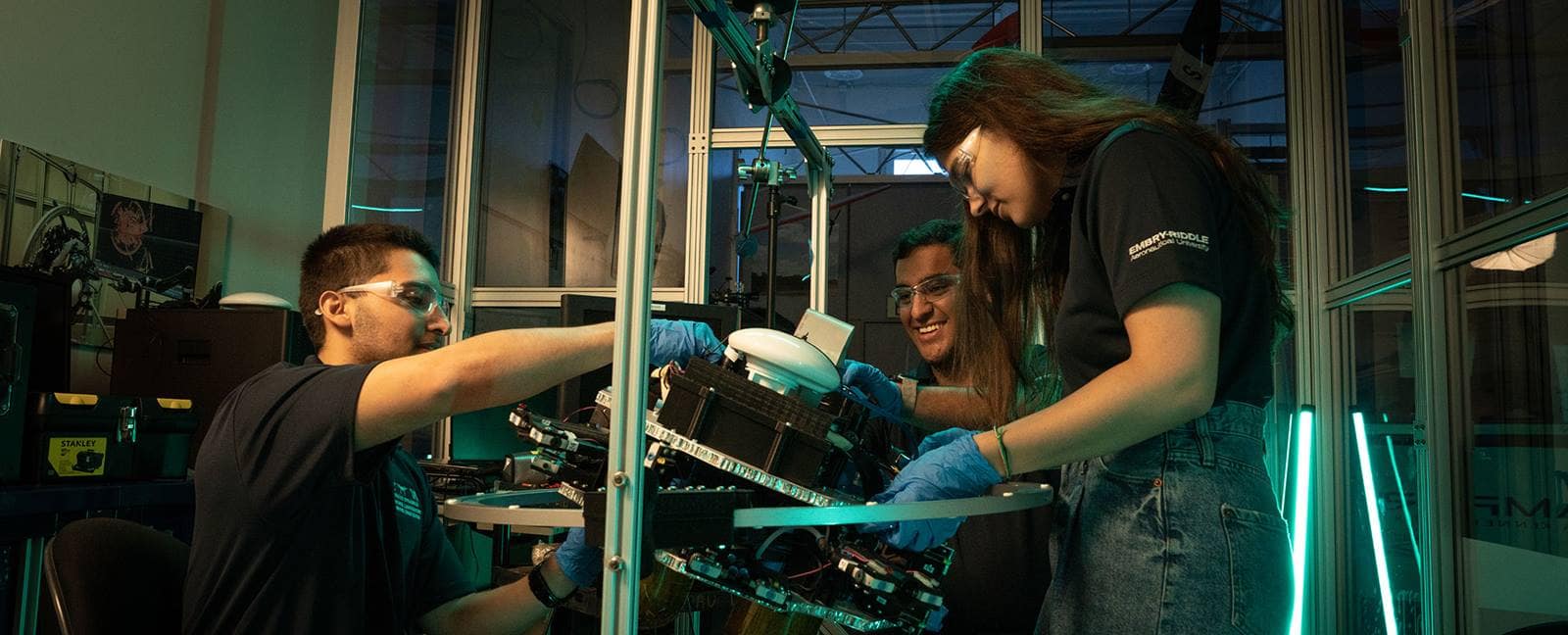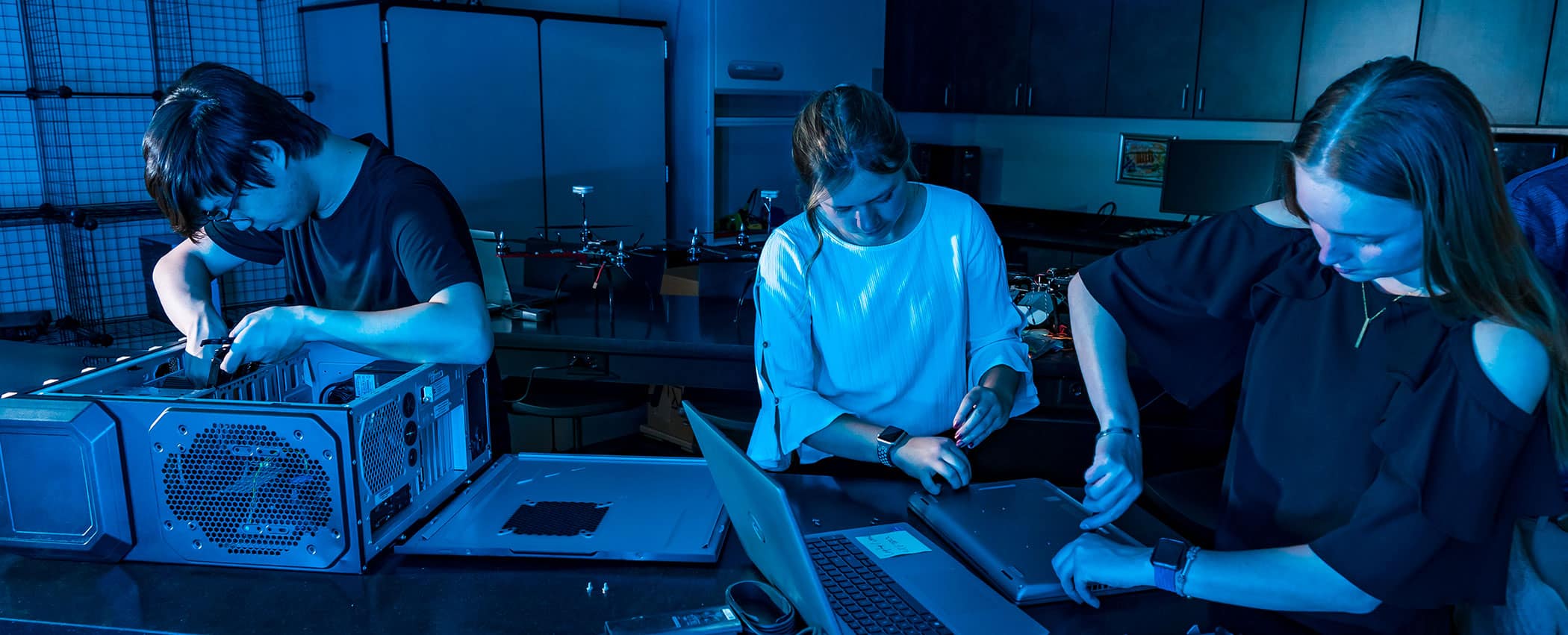
Associate of Science in
Engineering Fundamentals
The A.S. in Engineering Fundamentals is the first step in engineering studies, designed to give students a foundation in math, physics and practical design.
About the Associate of Science in Engineering Fundamentals
The Associate of Science in Engineering Fundamentals at Embry‑Riddle is the first step to opening the door to continued engineering studies at Worldwide or an Embry‑Riddle residential campus in Florida or Arizona.
Through the Engineering Fundamentals program, students gain practical design experience using basic models, core engineering concepts and simulations. Students also gain a strong foundation in math and physics. Experienced faculty members provide plenty of firsthand knowledge and individual attention through the associate degree.
Program Educational Objectives
- Graduates will be able to apply fundamental engineering skills and knowledge specifically tailored to the needs of the aviation and aerospace industry, demonstrating proficiency in STEM-related areas.
- Graduates will be able to pursue an undergraduate engineering or professional degree in mechanical, aviation and aerospace sectors, including technology, regulations and industry practices.
- Graduates will continue to be involved in lifelong learning processes and practice their profession ethically while demonstrating excellent teamwork and communication skills.
Student Learning Outcomes
Learning opportunities students will have while studying Engineering Fundamentals:
- Have an ability to identify, formulate and solve broadly defined technical or scientific problems by applying knowledge of mathematics and science and/or technical topics to areas relevant to the discipline.
- Have an ability to conduct experiments or test theories, and analyze and interpret data.
- Have an ability to function effectively on teams.
- Have an ability to demonstrate the knowledge of professional and ethical responsibilities.
- Have an ability to communicate effectively.
- Have an ability to apply appropriate dimensional units.
Engineering Fundamentals Career Opportunities
Careers and Employers
With a placement rate of 85.7% within a year of graduation, Embry-Riddle graduates are set to enter the workforce in various positions, including compliance engineering, manufacturing engineering and aviation maintenance.
Students earning an online engineering associate degree often continue to earn a bachelor's degree or accept employment offers from top companies such as The Boeing Company, General Electric, Lockheed Martin and the U.S. Air Force.
Engineering Fundamentals Salary Information
Receiving an associate in core engineering concepts from Embry-Riddle provides the opportunity for competitive salaries, averaging $88,200 annually as of 2022.
DETAILS
About Engineering Fundamentals at the Worldwide & Online Campus
The Associate of Science in Engineering Fundamentals is for aspiring engineering students who want world-class educational opportunities that meet their needs in new and innovative ways. Embry‑Riddle's online engineering associate degree gives students the best of both worlds: access to our outstanding engineering curriculum plus a unique learning model designed for success.
There is no need to relocate far from home. At the Worldwide & Online Campus, you can structure your education around your lifestyle, taking classes where you want and when you want.
Engineering Fundamentals Information
- Credits: 63
- Online or In-Person: Fully online, EagleVision Virtual Classroom or see if a Worldwide location is close to you
Professional Accreditation
The Associate of Science in Engineering Fundamentals is accredited by the Applied and Natural Science Accreditation Commission of ABET, https://www.abet.org, under the commission's General Criteria with no applicable program criteria.
Helpful Links
- Attend a Worldwide Virtual Info Session
- Discover the Department's Faculty
- Explore the Fields of Study: Engineering
- Find Related Clubs & Organizations
Student Learning Outcomes
Students will:
- Have an ability to identify, formulate, and solve broadly defined technical or scientific problems by applying knowledge of mathematics and science and/or technical topics to areas relevant to the discipline.
- Have an ability to conduct experiments or test theories and analyze and interpret data.
- Have an ability to function effectively on teams.
- Have an ability to demonstrate the knowledge of professional and ethical responsibilities.
- Have an ability to communicate effectively.
- Have an ability to apply appropriate dimensional units.
DEGREE REQUIREMENTS
General Education
| General Education | ||
| Embry-Riddle courses in the general education categories of Communication Theory and Skills, Humanities, and Social Sciences may be chosen from those listed below, assuming prerequisites are met. Courses from other institutions are acceptable if they fall into these broad categories and are at the level specified. | ||
| Communication Theory and Skills | ||
| ENGL 123 | English Composition | 3 |
| COMD 219 | Speech | 3 |
| ENGL 221 | Technical Report Writing | 3 |
| Humanities elective (HUMN 140 Series) | 3 | |
| ECON 225 | Engineering Economics | 3 |
| Mathematics | ||
| MATH 241 | Calculus and Analytical Geometry I | 4 |
| Total Credits | 19 | |
Core/Major
| ENGR 101 | Introduction to Engineering | 3 |
| ENGR 115 | Introduction to Computing for Engineers | 3 |
| ENGR 120 | Graphical Communications | 3 |
| ESCI 201 | Statics | 3 |
| ESCI 202 | Solid Mechanics | 3 |
| ESCI 204 | Dynamics | 3 |
| ESCI 206 | Fluid Mechanics | 3 |
| MATH 242 | Calculus and Analytical Geometry II | 4 |
| MATH 243 | Calculus and Analytical Geometry III | 4 |
| MATH 345 | Differential Equations and Matrix Methods | 4 |
| PHYS 150 | Physics I for Engineers | 3 |
| PHYS 160 | Physics II for Engineers | 3 |
| PHYS 250 | Physics III for Engineers | 3 |
| PHYS 253 | Physics Laboratory for Engineers | 2 |
| Total Credits | 44 | |
| Total Degree Requirements | 63 | |
Plan of Study (ASEF)
Year One
| Term 1 | Credits | |
|---|---|---|
| ENGR 101 | Introduction to Engineering | 3 |
| ENGL 123 | English Composition | 3 |
| Credits Subtotal | 6.0 | |
| Term 2 | ||
| MATH 241 | Calculus and Analytical Geometry I | 4 |
| ENGR 115 | Introduction to Computing for Engineers | 3 |
| Humanities (HUMN) Lower Level | 3 | |
| Credits Subtotal | 10.0 | |
| Term 3 | ||
| MATH 242 | Calculus and Analytical Geometry II | 4 |
| PHYS 150 | Physics I for Engineers | 3 |
| Credits Subtotal | 7.0 | |
| Term 4 | ||
| PHYS 160 | Physics II for Engineers | 3 |
| COMD 219 | Speech | 3 |
| ECON 225 | Engineering Economics | 3 |
| Credits Subtotal | 9.0 | |
| Credits Total: | 32.0 | |
Year Two
| Term 1 | Credits | |
|---|---|---|
| ESCI 201 | Statics | 3 |
| MATH 243 | Calculus and Analytical Geometry III | 4 |
| ENGL 221 | Technical Report Writing | 3 |
| Credits Subtotal | 10.0 | |
| Term 2 | ||
| ENGR 120 | Graphical Communications | 3 |
| ESCI 202 | Solid Mechanics | 3 |
| ESCI 204 | Dynamics | 3 |
| Credits Subtotal | 9.0 | |
| Term 3 | ||
| ESCI 206 | Fluid Mechanics | 3 |
| MATH 345 | Differential Equations and Matrix Methods | 4 |
| Credits Subtotal | 7.0 | |
| Term 4 | ||
| PHYS 250 | Physics III for Engineers | 3 |
| PHYS 253 | Physics Laboratory for Engineers | 2 |
| Credits Subtotal | 5.0 | |
| Credits Total: | 31.0 | |
| Total Degree Requirements | 63 | |
Get Started Now:
Summary
63 Credits
Estimate your tuition by using the Tuition Calculator
View Financial Aid Information
Learn more about the benefits of an Online Degree
Learn about our General Education
Find out about transferring credits to this degree
Learn more about our Veterans & Military benefits
View our Academic Calendar
Search Courses for this degree



